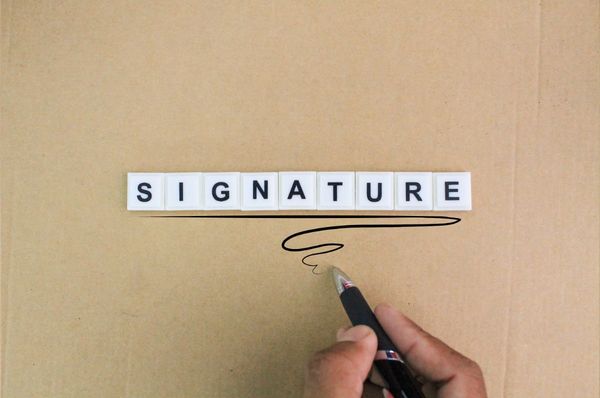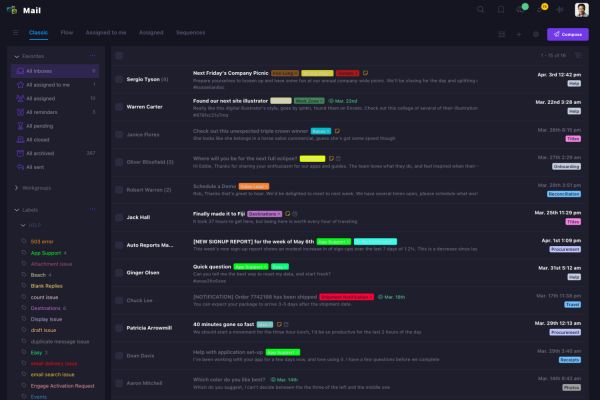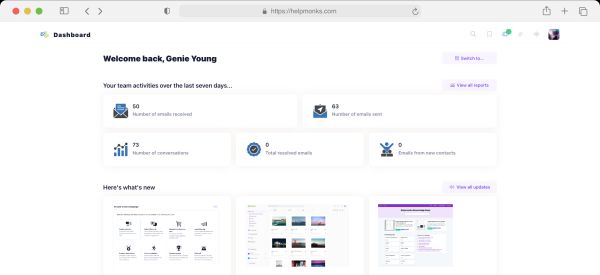
Introducing new pricing for Helpmonks
Discover Helpmonks' new pricing structure, featuring a flexible PRO plan, a FREE plan for smaller teams, and an exciting affiliate program. Experience unparalleled email management solutions today!
Read nowExcellent customer service can create loyal customers for life who are willing to refer your product or service to friends, family, and colleagues. Providing this type of excellent customer service starts with a genuine desire to delight your customers.
Good customer service typically means providing timely and attentive service and making sure their needs are met in a manner that positively reflects your business.
Providing excellent customer service means going the extra mile. Ensuring a customer is happy and satisfied with a company's products or services. It also involves providing service to a customer in a timely, pleasant manner.
Customer service is all about meeting and exceeding the expectations of the customer. The expectations could be different for each type of business, but the principle is the same. Customers expect those assisting them to be extremely helpful, positive, and informative.
Total customer experience is vital in the customer service industry. Employees working in it understand that the whole customer experience is essential, from the first contact to the transaction's completion.
Customer service is all about how you make the entire experience for the customer. Excellent customer service means going above and beyond their expectations.
It means showing the customer how important they are to you and the business by interacting with them in a friendly, helpful, and positive way. The idea is to leave a lasting impression on customers by working with them and assisting them in the best way possible.
Excellent customer service involves being an expert on the products and services your company sells. Furthermore, excellent customer service means making every aspect of the customer's experience a positive one.
Influential people and communication skills are what helps to excel in customer service positions. Always ensure customers are delighted with their decisions by conducting follow-ups and resolving any conflicts or problems. Good customer service means meeting expectations, but excellent customer service means exceeding them.
You need to find people with the right attitude, personality, and customer skill set. The most important trait to look for in a customer service representative is a proactive, helpful attitude.
Customer service is not an easy task. It takes a positive person with a positive attitude to make it through the tough times with a smile on their face.
The customer support team must stay positive throughout the day. Your customer service team is the company's voice, so you want to ensure they are easy to talk to and make your customers feel comfortable.
Being able to explain things logically is essential for providing clear and concise answers to customers.
Once you find the right team, the first step is to make sure they understand your company, product, and services. A company is more than just the products and services that it sells and supports. A company has a purpose and a mission. A motivated employee truly understands what the company is about, the mission statement, and the company goals.
Think of this as building the foundation that will support the rest of the specific product knowledge. Once the foundation is in place, it's time for deep-dive training into both the products and services you sell as well as the systems and technology you use to provide support. Start with educational training – presentations, webinars, speeches, tests – and then move to shadowing.
Take your best customer service employee and have the new team members shadow this employee while on the job. Have the new agents listen to how your top performers answer inbound requests, watch how they log details, understand the words and diction they use with customers.
Choosing the right people to lead the new employees on the job will have a lasting impact on how your new team members interact with customers when they go live. Once you have the right team in place, it's time to think about mastering the rest of customer service 101.
Providing exceptional customer service feels daunting when you need to decide every time a new problem comes up. To avoid this, think about all the possible escalation scenarios and have a playbook in place. When these situations arise, they're easy to address and don't cause stress. For example, if you deal with refunds, set a cap on what an agent can refund without an escalation. Standards like this will improve the number of first-call resolutions across the team and enhance the overall customer experience.
It's essential to make sure all of your employees understand how they should talk to, interact with, and assist customers. Provide employee training that gives your staff the tools they need to carry good service through the entire customer experience.
However, the need for these skills goes past your typical customer service roles. Every employee at your company needs a mindset that puts customers first. Every team, from product to marketing to finance, makes decisions that affect the customer.
Once you find employees who have these customer service skills, make sure they feel enabled to use them. Customer service skills apply to both sales, marketing, and customer success teams.

Successful companies constantly gather feedback from their customer. Hence, you should have a process in place to do something with the feedback you receive from. Take time to review feedback, identify areas for improvement, and make adjustments to your product and services.
Excellent customer service comes down to consistently checking in with your customers. Make sure they are happy with the products and services. Doing so successfully, you are on your way to becoming known for providing excellent customer service.
In the end, the skills of a customer service employee come down to caring.
Having empathy to understand each person's situation a rep interacts with and the authentic desire to help them will go a long way.
Consider this marketing quote by Amazon CEO Jeff Bezos:
We see our customers as guests to a party, and we are the hosts. It's our job every day to make every important aspect of the customer experience a little bit better.
Listening to customers is the foundation of effective customer service communication. Active listening in customer service means being focused on what the customer is saying, understanding what he means, and responding in a manner that respects what they say.
Behind every customer is a real person looking for guidance or a solution to a problem. It's critical to engage in active listening to make that person feel genuinely heard, understood, and served.
The more empathy you have, the more you listen to them, the more they will value their relationship and the product and services you offer. People want to be listened to. And customers do notice. Customers feel when companies act empathy when delivering customer service.
Research finds that most business problems can be attributed to poor communication. Phone calls and live chats are still the consumers' preferred methods of contacting customer service. Exercising active listening skills will reap valuable returns for any organization.
Listening to customers, even if that's just on social media or through feedback surveys, will give you a wealth of information about your customer's view of your product and services. Their answers may be wildly different than you think.
The best way to reassure someone you're listening to is to ask any follow-up questions. Asking questions makes customers feel that they are being given the time to voice their concerns and even ask their questions.
One of the best ways to not rush a customer's call is by giving the customer the option of receiving a call-back. A call-back allows customer service agents to take their time with conversation, as they don't have to rush through their queues. Besides, it will make the customers feel as though their time is valued, rather than being wasted waiting on hold.
Active listening is critical when customers are upset, frustrated and perhaps exhibiting some hostility. It's imperative to ask follow-up questions, relaying back their position, and empathizing with their frustrations.
The customer service team is the backbone of every organization. The team that spends the most time speaking to your customers, understanding their needs, solving their problems, and delivering the voice of your company. Each interaction is essential and is part of a longer customer journey that builds trust and creates lasting relationships. Without customer service, we likely wouldn't have customers for very long.
Customer service, if done correctly, can also create one of the most significant revenue opportunities – referrals from happy customers. Whether you're a brand new business or have provided customer service for years, it never hurts to revisit customer service 101.
Customer Service 101 should start at the beginning, i.e., with the right people. If you don't have the right people in place, it's not impossible. Still, it is significantly more challenging to deliver exceptional customer service.
As we talked about earlier, the customer service team is the authentic voice of the company. They have the best insight into how their customers feel, their pain points, and what they love about your product or service.
When your customer service team receives complaints or requests, ensure that you have a process in place to capture and track this data. It will become a database of critical information that will help drive improvements in your organization's other departments. Your product team will know what customers want. Your sales team will know where they are over-promising, your onboarding team will know what they need to add to training curriculums, and much more.
Use the data that you receive every day. Your customer service team will become the backbone that guides the company's success.

The only way to correctly answer a question is first to understand it. Figure out what the customer truly needs. It's worth noting that what a client says or asks can differ from what they want.
For example, a client may say they need a particular feature to use the product. If you understand the problem, you might suggest a different system component that isn't what they asked for but solves the same problem.
Listening is the secret of customer service. It means you are actively hearing what your customers are saying, as well as what they are not communicating.
By understanding your customers' needs, you can achieve a consistently higher satisfaction rate. Listening to your customers is knowing what they need to hear. It can be different than what they want to hear. They want to hear that you'll fix the bug immediately, or you'll build their feature request tomorrow. What they need to hear is that you have listened to them and are working on a solution.
A straightforward and sincere apology goes a long way when a customer is upset, even if it's not your fault. As a customer support team, we should all embrace the complaints of customers. It's sometimes hard to hear, but it's valuable and allows us to grow and improve.
Always encourage and welcome feedback from clients and make sure you document this feedback in a structured way.
No one wants to feel like they are wasting time and everyone wants to feel important. These are two fundamental truths that are easy to deliver with a few simple steps.
Customers don't expect the world when they contact customer service. They want to be treated like people. A smile and a warm hello can go a long way. Make your customers feel important by treating them as individuals and not as a help desk ticket. Address them by name, reference previous conversations, and tell them that you value their time. A few small words can show them that you care.
If a customer calls about an issue they have already called about, let them know that you see the conversation, understand the problem, and give them an update. Don't blindly ask them to repeat their problem. It causes frustration, and they feel like they wasted time in their previous conversations.
If you have to put a customer on hold, inform them how long it will be and why you are putting them on hold. Waiting 5 minutes on hold is much less painful if you know up front that it will be 5 minutes and that the agent addresses your issue. Waiting 5 minutes when you think it should be less than 30 seconds feels like an eternity. It is undoubtedly an easy way to enrage even the most patient customers.
Want to know how to achieve excellent customer satisfaction? Respond faster.
It's essential to respond quickly to all inquiries. We make it a habit to respond to each customer's request, even if it is only to say we are looking into the issue. A response is always better than none, so the customer doesn't feel ignored.
It's no surprise that the number one thing people care about when trying to get help is response time. No one wants to wait on hold for 20 minutes, especially if they're unsure you can even help. If a customer chats for support and doesn't get a response within a minute or two, they will leave with a poor impression of your company.
Leveraging a bot becomes valuable in this circumstance. You can have a friendly and helpful bot agent respond to a chat, gather information about the customer and their issue, and seamlessly pass it off to the right agent.
The best is to set the proper expectation. If you communicate that you will respond to emails within 24 hours, then follow through on this. If you say you answer your chats within 1 minute, then that's great. As long as your customer knows when they will get a response from you, they won't be disappointed.
If you're looking to increase response times with smaller teams, a quick win is incorporating a chat widget on your website. Agents can respond faster, handle multiple conversations simultaneously, and more efficiently provide support on the go.

First impressions are critical. The first words out of your mouth set the stage for the rest of the conversation. If you're curt, you'll set the tone and likely get a similar response back. If you're warm and welcoming, your exchange will be much more pleasant. Don't underestimate common courtesy in the course of conversation. A simple please and thank you are appreciated. You are the one servicing your customer. Show them the appreciation they deserve for being your customer. Unsurprisingly, this should be at the top of the list for customer service 101.
One of the challenges that customer service teams face as they scale is how to retain the authentic and personal support style when-when you need to implement standards. While this is challenging, it's not impossible. It starts by equipping the agents with the correct data. The more an agent knows about a customer, the more they can relate to the person they are helping.
Pulling all the customer interactions into one tool is helpful for this. Hence, we encourage that your team leverages an all-in-one team collaboration tool that combines all the data into one platform.
Customer service starts with a friendly demeanor. A good practice is to smile, even when handling customer service requests over lice chat or email. Customers feel when they are genuinely being helped with their demands.
Customer service often can involve emotions. Therefore, it's essential to make sure your customer service team is always courteous and respectful. Never let your feelings overtake your desire and see that your customer walk away happy.
The difference between good and excellent customer service is the ability to go beyond just answering the question.
Excellent customer service happens when you don't just give the answer they want, but you go above and beyond. When you genuinely help them, customers pay it forward.
When you tell a customer you will help with something or fix something, do it! Never say yes to get someone off the phone and then not follow through. While it seems easy at the time, it will come back to haunt you. In today's world of advanced technology, software solutions track everything, and there is no hiding.
A bad experience can echo through social media and online reviews very quickly. It can help have a customer service team that focuses on longer-term projects and is not part of the inbound support queue. This team can complete those projects that agents say yes to but can't do right at that moment. This separate team dedicates their time to fulfilling promises so that your front-line team can go the extra mile for your customers.
Think about your particular business and ask yourself what you can do those other companies can't. Excellent customer service is a real differentiator in today's crowded market. Each company has a unique opportunity to add that badge to their brand with a bit of focus and care.
Gratitude is memorable, and it can remind your customers why they use your product or services. Saying thank you is one of the easiest ways to start a habit of good customer service.
If you're still working off a phone and a spreadsheet, you're making it too hard on yourself. Technology is advancing quickly, and with modern tools, you can now answer 4-5x more inbound requests with the same size team.
Your customer service platform should provide your customers multiple ways to get in touch with you but make it easy for your team to manage. Find a trustworthy multi-channel support platform that offers phone and email and live chat, email marketing, email automation, and more. A sound system will allow questions from all of these channels to flow into a single queue so you can answer your customers no matter how they want to talk to you. It is essential to use a system that is going to grow with your team.

Discover Helpmonks' new pricing structure, featuring a flexible PRO plan, a FREE plan for smaller teams, and an exciting affiliate program. Experience unparalleled email management solutions today!
Read now
Dynamic email signatures increase brand visibility, build brand identity, and boost conversions. Learn how to create and update dynamic email signatures.
Read now
Looking for an email marketing automation software? This guide shows what to look for. We'll also review the best tools for your online marketing needs.
Read now
Using customer engagement solutions helps you keep your existing customer base and grow. Here are the top 10 customer engagement solutions for your business.
Read now
Empower your team and delight your customers.
